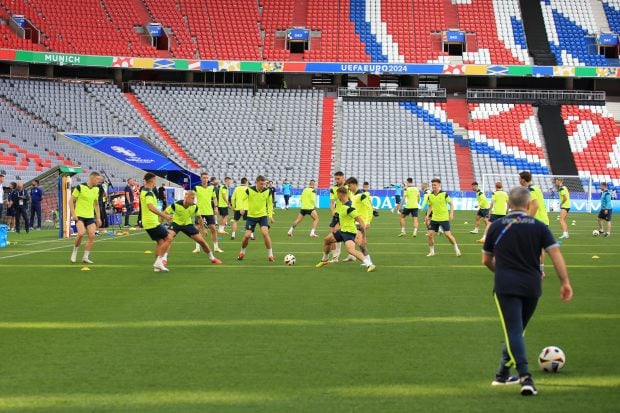Sometimes screenings at Cannes are showstoppers for reasons that exist apart from the films themselves. The Iranian director Mohammad Rasoulof received a standing ovation when he went to take his seat in the Grand Theatre Lumière for yesterday’s premiere of “The Seed of the Sacred Fig.” Surely most if not all of the audience members in the 2,300-seat auditorium were aware that, less than two weeks earlier, Rasoulof revealed that he had escaped Iran, where he was facing another prison sentence, through the mountains. At the screening, he held up pictures of two of his lead actors, Soheila Golestani and Misagh Zare.
Few films could withstand that buildup, but “The Secret of the Sacred Fig” landed onscreen like a bolt of pure, righteous anger; the consensus among the people I spoke to afterward is that it’s the front-runner for the Palme d’Or. The drama involves the political and personal tensions within a family. The father, Iman (Zare), has just taken a role as a judicial investigator, with an eye on an eventual promotion to higher in the judiciary. That means that his wife, Najmeh (Golestani), and daughters, Rezvan (Mahsa Rostami) and Sana (Setareh Maleki), will be under increased scrutiny. Their conduct must be irreproachable, they’re warned. Iman has been given a gun for his own protection.
But Iman’s arrival in the position occurs at the same time as an outbreak of anti-theocratic protests in response to a woman’s death. He’s swamped with work that troubles him—he has only a few moments to make decisions on each case, and sometimes he is dealing with death sentences. At the same time, his daughters’ sympathies are with the protests, in which they are supposed to avoid even the appearance of participation. When Najmeh, Sana, and Rezvan clandestinely provide medical care to Sadaf (Niousha Akhshi), a college friend of Rezvan’s who has been hit with buckshot, it accelerates a cycle of secret-keeping within the family. Then the gun goes missing.
Until this point, the film has had a superficial resemblance to some of Asghar Farhadi’s dramas, which strive to show that every character is acting on reasonable (if blinkered) motives. But “The Secret of the Sacred Fig” is something much darker: It shows just how casually a repressive society employs the tools of authoritarianism and psychological intimidation. Even close family members can’t be trusted. Friends suddenly become interrogators; minor missteps mean major prison time. To make this film secretively and to show it to an international film festival is an act of true courage and artistry.
Payal Kapadia was one of the most exciting names announced for this year’s competition. Her debut feature, “A Night of Knowing Nothing,” which screened in Directors’ Fortnight three years ago, was a distinctive, politically charged hybrid film that melded documentary and archival footage with a fictitious voice-over to reflect on student protests and casteism in contemporary India.
Her new film, “All We Imagine as Light,” is said to be the first Indian feature to screen in competition in 30 years. It turns out to be not another nonfiction feature but a drama about, principally, two women, Prabha (Kani Kusruti) and Anu (Divya Prabha), nurses who work at the same hospital in Mumbai and are also roommates. Prabha has a husband in Germany, but it seems that he’s forgotten her—the phone calls became less and less frequent until they stopped. Anu is in a covert, cross-faith relationship with a Muslim boyfriend (Hridhu Haroon), which is tricky for reasons of propriety and logistics.
The progression of the narrative owes a lot to Abbas Kiarostami, both in the ambiguity surrounding the gift of a German-made rice cooker that Prabha receives and in a late development—after the film has shifted locations to a coastal village—that recalls Kiarostami’s “Certified Copy.” The film is powerfully feminist in its perspective, impressively naturalistic in its storytelling, and boldly mysterious in its gentle irresolution.
Shown at the end of the competition almost as an afterthought, Michel Hazanavicius’s “The Most Precious of Cargoes” might have played perfectly as a network television holiday special, but screened in this context, it was difficult to account for. Narrated by Jean-Louis Trintignant, who died in 2022, and based on a story by Jean-Claude Grumberg, it is an animated feature about how a woodcutter and his wife secretly take in a baby girl from a train that was headed to the camps. The animation is in a deliberately simple style, and the storytelling favors a fable-ish abstraction. (The husband is initially antisemitic until he warms to the child, although there’s something perturbingly coy about the film’s refusal ever to use the word “Jewish.”) The closing voice-over, which seems aimed at reconciling the fairy tale trappings and the serious subject matter, is a muddle.




:format(jpeg):quality(80)/wp-content/uploads/2024/06/dinamo-4.jpg)
